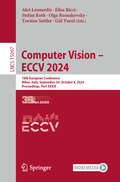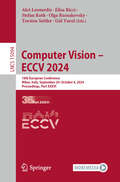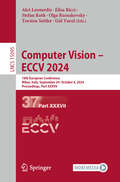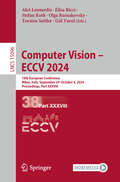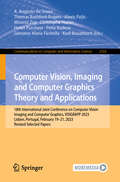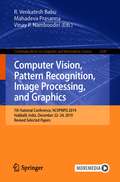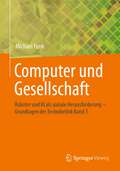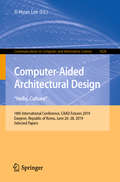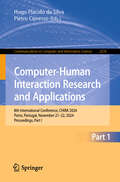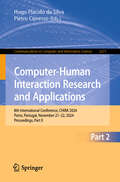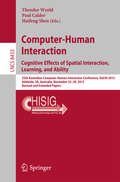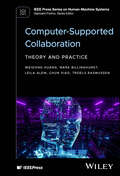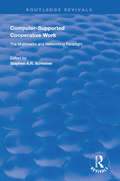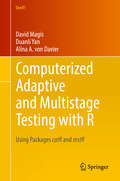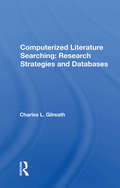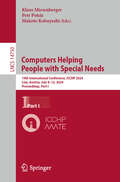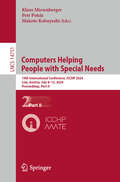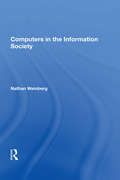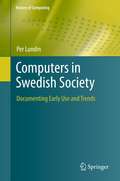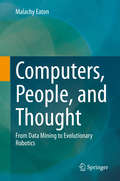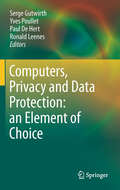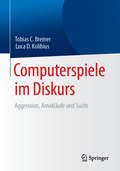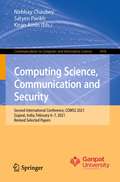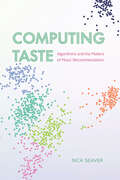- Table View
- List View
Computer Vision – ECCV 2024: 18th European Conference, Milan, Italy, September 29–October 4, 2024, Proceedings, Part XXXIX (Lecture Notes in Computer Science #15097)
by Stefan Roth Aleš Leonardis Elisa Ricci Torsten Sattler Olga Russakovsky Gül VarolThe multi-volume set of LNCS books with volume numbers 15059 up to 15147 constitutes the refereed proceedings of the 18th European Conference on Computer Vision, ECCV 2024, held in Milan, Italy, during September 29–October 4, 2024. The 2387 papers presented in these proceedings were carefully reviewed and selected from a total of 8585 submissions. The papers deal with topics such as computer vision; machine learning; deep neural networks; reinforcement learning; object recognition; image classification; image processing; object detection; semantic segmentation; human pose estimation; 3d reconstruction; stereo vision; computational photography; neural networks; image coding; image reconstruction; motion estimation.
Computer Vision – ECCV 2024: 18th European Conference, Milan, Italy, September 29–October 4, 2024, Proceedings, Part XXXVI (Lecture Notes in Computer Science #15094)
by Stefan Roth Aleš Leonardis Elisa Ricci Torsten Sattler Olga Russakovsky Gül VarolThe multi-volume set of LNCS books with volume numbers 15059 up to 15147 constitutes the refereed proceedings of the 18th European Conference on Computer Vision, ECCV 2024, held in Milan, Italy, during September 29–October 4, 2024. The 2387 papers presented in these proceedings were carefully reviewed and selected from a total of 8585 submissions. They deal with topics such as computer vision; machine learning; deep neural networks; reinforcement learning; object recognition; image classification; image processing; object detection; semantic segmentation; human pose estimation; 3d reconstruction; stereo vision; computational photography; neural networks; image coding; image reconstruction; object recognition; motion estimation.
Computer Vision – ECCV 2024: 18th European Conference, Milan, Italy, September 29–October 4, 2024, Proceedings, Part XXXVII (Lecture Notes in Computer Science #15095)
by Stefan Roth Aleš Leonardis Elisa Ricci Torsten Sattler Olga Russakovsky Gül VarolThe multi-volume set of LNCS books with volume numbers 15059 up to 15147 constitutes the refereed proceedings of the 18th European Conference on Computer Vision, ECCV 2024, held in Milan, Italy, during September 29–October 4, 2024. The 2387 papers presented in these proceedings were carefully reviewed and selected from a total of 8585 submissions. The papers deal with topics such as computer vision; machine learning; deep neural networks; reinforcement learning; object recognition; image classification; image processing; object detection; semantic segmentation; human pose estimation; 3d reconstruction; stereo vision; computational photography; neural networks; image coding; image reconstruction; motion estimation.
Computer Vision – ECCV 2024: 18th European Conference, Milan, Italy, September 29–October 4, 2024, Proceedings, Part XXXVIII (Lecture Notes in Computer Science #15096)
by Stefan Roth Aleš Leonardis Elisa Ricci Torsten Sattler Olga Russakovsky Gül VarolThe multi-volume set of LNCS books with volume numbers 15059 up to 15147 constitutes the refereed proceedings of the 18th European Conference on Computer Vision, ECCV 2024, held in Milan, Italy, during September 29–October 4, 2024. The 2387 papers presented in these proceedings were carefully reviewed and selected from a total of 8585 submissions. The papers deal with topics such as computer vision; machine learning; deep neural networks; reinforcement learning; object recognition; image classification; image processing; object detection; semantic segmentation; human pose estimation; 3d reconstruction; stereo vision; computational photography; neural networks; image coding; image reconstruction; motion estimation.
Computer Vision, Imaging and Computer Graphics Theory and Applications: 18th International Joint Conference on Computer Vision, Imaging and Computer Graphics, VISIGRAPP 2023, Lisbon, Portugal, February 19–21, 2023, Revised Selected Papers (Communications in Computer and Information Science #2103)
by Petia Radeva Giovanni Maria Farinella Helen Purchase Christophe Hurter Kadi Bouatouch Alexis Paljic A. Augusto de Sousa Mounia Ziat Thomas Bashford-RogersThis book constitutes the refereed post-conference proceedings of the 19th International Joint Conference on Computer Vision, Imaging and Computer Graphics Theory and Applications, VISIGRAPP 2023, held in Lisbon, Portugal, during February 19–21, 2023. The 17 revised full papers presented were carefully selected from 395 submissions. VISIGRAPP aims to bring together researchers and practitioners interested in theoretical advances and applications of computer vision, information visualization, computer graphics and interaction.
Computer Vision, Pattern Recognition, Image Processing, and Graphics: 7th National Conference, NCVPRIPG 2019, Hubballi, India, December 22–24, 2019, Revised Selected Papers (Communications in Computer and Information Science #1249)
by R. Venkatesh Babu Mahadeva Prasanna Vinay P. NamboodiriThis book constitutes the refereed proceedings of the 7th National Conference on Computer Vision, Pattern Recognition, Image Processing, and Graphics, NCVPRIPG 2019, held in Hubballi, India, in December 2019.The 55 revised full papers 3 short papers presented in this volume were carefully reviewed and selected from 210 submissions. The papers are organized in topical sections on vision and geometry, learning and vision, image processing and document analysis, detection and recognition.
Computer und Gesellschaft: Roboter und KI als soziale Herausforderung – Grundlagen der Technikethik Band 3
by Michael FunkWelche Wirkungen haben Robotik und Künstliche Intelligenz (KI) auf die Gesellschaft? Wie verändern Algorithmen und Machine Learning unser soziales Umfeld? Vor welchen ethischen Herausforderungen stehen wir? Vorliegendes Buch bietet zu diesen und weiteren Fragen systematische Analysen. Allgemeine und spezielle Roboterkonzepte von Androiden über Social Robots bis hin zu kollaborativen Industrierobotern werden vorgestellt. Hinzu treten Drohnen im militärischen und zivilen Einsatz sowie diverse Formen der Mensch-Maschine-, Tier-Maschine- und Pflanze-Maschine-Interaktion. Verschiedene Begriffe und Paradigmen der KI werden auch abseits der Informatik herausgearbeitet, reale und spekulative Entwicklungen eingeordnet. Vor diesem Hintergrund geraten ethisch-gesellschaftliche Brennpunkte in den Blick. Beispiele, Aufgaben, vertiefende Infos zu Hintergründen und Übersichten laden zum kritischen Weiterdenken ein. Es bildet den dritten, in sich abgerundeten Teil der Buchreihe Grundlagen der Technikethik.Haben wir die Zukunft, die wir brauchen, und brauchen wir die Zukunft, die wir haben?
Computer-Aided Architectural Design. "Hello, Culture": 18th International Conference, CAAD Futures 2019, Daejeon, Republic of Korea, June 26–28, 2019, Selected Papers (Communications in Computer and Information Science #1028)
by Ji-Hyun LeeThis book constitutes selected papers of the 18th International Conference on Computer-Aided Architectural Design Futures, CAAD Futures 2019, held in Daejeon, Republic of Korea, in June 2019. The 34 revised full papers presented were carefully reviewed and selected from 194 submissions. The papers are organized in topical sections on theory, methodology and practice of architectural and interior design; support systems for design decisions; tools, methods and implementation of urban design; rethinking space and spatial behavior; fabrication and materialization; and shape studies.
Computer-Human Interaction Research and Applications: 8th International Conference, CHIRA 2024, Porto, Portugal, November 21–22, 2024, Proceedings, Part I (Communications in Computer and Information Science #2370)
by Hugo Plácido da Silva Pietro CipressoThis two-volume set, CCIS 2370 and CCIS 2371, constitutes the proceedings of the 8th International Conference on Computer-Human Interaction Research and Applications, CHIRA 2024, held Porto, Portugal, during November 21–22, 2024. The 16 full papers and 45 short papers presented in these volumes were carefully reviewed and selected from 76 submissions. These papers focus on the research advancements and practical applications within various areas in the field of Computer-Human Interaction, including Human Factors and Information Systems, Interactive Devices, Interaction Design and Adaptive and Intelligent Systems.
Computer-Human Interaction Research and Applications: 8th International Conference, CHIRA 2024, Porto, Portugal, November 21–22, 2024, Proceedings, Part II (Communications in Computer and Information Science #2371)
by Hugo Plácido da Silva Pietro CipressoThis two-volume set, CCIS 2370 and CCIS 2371, constitutes the proceedings of the 8th International Conference on Computer-Human Interaction Research and Applications, CHIRA 2024, held Porto, Portugal, during November 21–22, 2024. The 16 full papers and 45 short papers presented in these volumes were carefully reviewed and selected from 76 submissions. These papers focus on the research advancements and practical applications within various areas in the field of Computer-Human Interaction, including Human Factors and Information Systems, Interactive Devices, Interaction Design and Adaptive and Intelligent Systems.
Computer-Human Interaction. Cognitive Effects of Spatial Interaction, Learning, and Ability: 25th Australian Computer-Human Interaction Conference, OzCHI 2013, Adelaide, SA, Australia, November 25-29, 2013. Revised and Extended Papers (Lecture Notes in Computer Science #8433)
by Theodor Wyeld Paul Calder Haifeng ShenThis book constitutes the thoroughly refereed post-conference proceedings of the 25th Australian Conference on Computer-Human Interaction, OzCHI 2013, held in Adelaide, SA, Australia, in November 2013. The 11 revised extended papers were carefully reviewed and selected from 192 submissions and cover topics on multi-dimensional interaction; video gaming; spatial learning; and physical spatial interaction.
Computer-Supported Collaboration: Theory and Practice (IEEE Press Series on Human-Machine Systems)
by Weidong Huang Leila Alem Mark Billinghurst Chun Xiao Troels RasmussenDiscover the latest developments in AR, VR, mobile, and wearable technologies for the remote guidance of physical tasks In Computer-Supported Collaboration: Theory and Practice, an expert team of researchers delivers the latest instruction in using augmented reality (AR), virtual reality (VR), and mobile or wearable technology to support remote guidance on physical tasks. The authors offer an overview of the field before moving on to discuss state-of-the-art research developments in everything from shared visual spaces to the use of hand gestures and gaze information for better collaboration. The book also describes the hardware devices, software tools, and libraries that can be used to help build remote guidance systems, as well as the industrial systems and applications that have been used in real world settings. Finally, Computer-Supported Collaboration includes a discussion of the current challenges faced by practitioners in the field and likely future directions for new research and development. Readers will also discover: A thorough introduction and review of the art of remote guidance research and engineering Comprehensive explorations of the shared visual space used to support common grounding and the remote guidance of physical tasks, as well as mobility support for local workers Practical discussions of mobility support of workers and helpers in remote guidance, including systems that support hands-free interaction In-depth explorations of communication cues in remote guidance, including systems that support gesturing and sketching on a touch-based display Perfect for researchers and professionals working in human-computer interaction or computer-supported collaborative work, Computer-Supported Collaboration: Theory and Practice is also an ideal resource for educators and graduate students teaching or studying in these fields.
Computer-supported Cooperative Work (Routledge Revivals)
by Stephen A.R. ScrivenerPublished in 1994, this work supplies an up-to-date view of Computer-Supported Cooperative Work (CSCW) and its role in empowering groups to achieve better solutions faster. The enabling technology and group organizational and behavioural aspects of CSCW should be of interest to a wide audience.
Computerized Adaptive and Multistage Testing with R: Using Packages catR and mstR (Use R!)
by Duanli Yan David Magis Alina A. von DavierThe goal of this guide and manual is to provide a practical and brief overview of the theory on computerized adaptive testing (CAT) and multistage testing (MST) and to illustrate the methodologies and applications using R open source language and several data examples. Implementation relies on the R packages catR and mstR that have been already or are being developed by the first author (with the team) and that include some of the newest research algorithms on the topic. The book covers many topics along with the R-code: the basics of R, theoretical overview of CAT and MST, CAT designs, CAT assembly methodologies, CAT simulations, catR package, CAT applications, MST designs, IRT-based MST methodologies, tree-based MST methodologies, mstR package, and MST applications. CAT has been used in many large-scale assessments over recent decades, and MST has become very popular in recent years. R open source language also has become one of the most useful tools for applications in almost all fields, including business and education. Though very useful and popular, R is a difficult language to learn, with a steep learning curve. Given the obvious need for but with the complex implementation of CAT and MST, it is very difficult for users to simulate or implement CAT and MST. Until this manual, there has been no book for users to design and use CAT and MST easily and without expense; i. e. , by using the free R software. All examples and illustrations are generated using predefined scripts in R language, available for free download from the book's website.
Computerized Literature Searching: Research Strategies And Databases
by Charles L. GilreathThe computer terminal is well on its way to being as commonplace as the telephone, and its usefulness to the scholar and scientist is so great that already computer screens and disks are seen frequently in academic offices. The value of computers in research is well established, with vast amounts of data being processed daily by all sizes of computers. Computers also have had dramatic effects on the researcher's literature-searching options: Scientists and scholars can now query enormous databases containing tens of millions of citations to published literature and can extract bibliographies tailored to their specific questions. The power and flexibility afforded the user of information by these literature-searching systems ease the burden of library work, but in order to use the systems effectively, it is necessary to understand both their capabilities and their limitations. Mr. Gilreath describes the principles underlying online bibliographic systems, the databases available, and the factors a researcher must consider in using them. He explores in some depth the relationship of the structure and terminology of publications in various fields to the literature-searching process and provides detailed guidelines for research in the life, health, agricultural, and social sciences, chemistry, physics, mathematics, geology, meteorology, engineering, education, psychology, business, law, current affairs, and the humanities. A glossary of literature-searching terms is included.
Computers Helping People with Special Needs: 19th International Conference, ICCHP 2024, Linz, Austria, July 8–12, 2024, Proceedings, Part I (Lecture Notes in Computer Science #14750)
by Klaus Miesenberger Petr Peňáz Makoto KobayashiThe two-volume set LNCS 14750 and 14751 constitutes the refereed proceedings of the International Conference on Computers Helping People with Special Needs, ICCHP 2024, which took place in Linz, Austria, during July 8-12, 2024. The 104 full papers included in the proceedings were carefully reviewed and selected from a total of 266 submission. They were organized in topical sections as follows: Part I: Software, Web and document accessibility; making entertainment content more inclusive; art Karshmer lectures in access to mathemtaics, science and engineering; tactile graphics and 3D models for blind people and shape recognition by touch; new methods for creating accessible material in higher education; ICT to support inclusive education - universal learning design (ULD); blind and low vision: orientation and mobility; blindness, low vision: new approaches to perception and ICT mediation; Part II: Accessibility for the deaf and hard-of-hearing; interaction techniques for motor disabled users; augmentative and alternative communication innovations in products and services, cognitive disabilities, assistive technologies and accessibility; dyslexia, reading/writing disorders: assistive technology and accessibility; accessible, smart, and integrated healthcare systems for elderly and disabled people; assistive technologies and inclusion for older people; advanced technologies for innovating inclusing and participation in labour, education, and everyday life; disability, inclusion, service provision, policy and legislation.
Computers Helping People with Special Needs: 19th International Conference, ICCHP 2024, Linz, Austria, July 8–12, 2024, Proceedings, Part II (Lecture Notes in Computer Science #14751)
by Klaus Miesenberger Petr Peňáz Makoto KobayashiThe two-volume set LNCS 14750 and 14751 constitutes the refereed proceedings of the International Conference on Computers Helping People with Special Needs, ICCHP 2024, which took place in Linz, Austria, during July 8-12, 2024. The 104 full papers included in the proceedings were carefully reviewed and selected from a total of 266 submission. They were organized in topical sections as follows: Part I: Software, Web and document accessibility; making entertainment content more inclusive; art Karshmer lectures in access to mathemtaics, science and engineering; tactile graphics and 3D models for blind people and shape recognition by touch; new methods for creating accessible material in higher education; ICT to support inclusive education - universal learning design (ULD); blind and low vision: orientation and mobility; blindness, low vision: new approaches to perception and ICT mediation; Part II: Accessibility for the deaf and hard-of-hearing; interaction techniques for motor disabled users; augmentative and alternative communication innovations in products and services, cognitive disabilities, assistive technologies and accessibility; dyslexia, reading/writing disorders: assistive technology and accessibility; accessible, smart, and integrated healthcare systems for elderly and disabled people; assistive technologies and inclusion for older people; advanced technologies for innovating inclusing and participation in labour, education, and everyday life; disability, inclusion, service provision, policy and legislation.
Computers In The Information Society
by Nathan WeinbergThis book examines the unfolding cultural and organizational impact of computers on human society. Through this analysis, it discusses the role of information technology in people's lives, interdependence between the society and its computer creations, and expectations in the information society.
Computers in Swedish Society: Documenting Early Use and Trends (History of Computing)
by Per LundinThis book reviews the shift in the historiography of computing from inventors and innovations to a user-perspective, and examines how the relevant sources can be created, collected, preserved, and disseminated. The text describes and evaluates a project in Sweden that documented the stories of around 700 people. The book also provides a critical discussion on the interpretation of oral evidence, presenting three case studies on how this evidence can inform us about the interaction of computing with large-scale transformations in economies, cultures, and societies. Features: describes a historiography aimed at addressing the question of how computing shaped and transformed Swedish society between 1950 and 1980; presents a user-centered perspective on the history of computing, after explaining the benefits of such an approach; examines the documentation of users, describing novel and innovative documentation methods; discusses the pros and cons of collaborative projects between academia and industry.
Computers, People, and Thought: From Data Mining to Evolutionary Robotics
by Malachy EatonIn this book the author discusses synergies between computers and thought, related to the field of Artificial Intelligence; between people and thought, leading to questions of consciousness and our existence as humans; and between computers and people, leading to the recent remarkable advances in the field of humanoid robots. He then looks toward the implications of intelligent 'conscious' humanoid robots with superior intellects, able to operate in our human environments. After presenting the basic engineering components and supporting logic of computer systems, and giving an overview of the contributions of pioneering scientists in the domains of computing, logic, and robotics, in the core of the book the author examines the meaning of thought and intelligence in the context of specific tasks and successful AI approaches. In the final part of the book he introduces related societal and ethical implications.The book will be a useful accompanying text in courses on artificial intelligence, robotics, intelligent systems, games, and evolutionary computing. It will also be valuable for general readers and historians of technology.
Computers, Privacy and Data Protection: An Element Of Choice
by Paul De Hert Yves Poullet Serge Gutwirth Ronald LeenesThis timely interdisciplinary work on current developments in ICT and privacy/data protection, coincides as it does with the rethinking of the Data Protection Directive, the contentious debates on data sharing with the USA (SWIFT, PNR) and the judicial and political resistance against data retention. The authors of the contributions focus on particular and pertinent issues from the perspective of their different disciplines which range from the legal through sociology, surveillance studies and technology assessment, to computer sciences. Such issues include cutting-edge developments in the field of cloud computing, ambient intelligence and PETs; data retention, PNR-agreements, property in personal data and the right to personal identity; electronic road tolling, HIV-related information, criminal records and teenager's online conduct, to name but a few.
Computerspiele im Diskurs: Aggression, Amokläufe und Sucht
by Tobias C. Breiner Luca D. KolibiusDieses Fachbuch ist eine umfassende Abhandlung zur Debatte um die negativen Auswirkungen von Computerspielen: Aggressionen, Amokläufe und Sucht. Die kontroverse Debatte zur Beziehung zwischen Computerspielen und Aggression wird hier auf Grundlage neuster wissenschaftlicher Erkenntnisse aufgearbeitet. Darüber hinaus inspirierte die Aufnahme in die aktuellste Version des Klassifikationssystems DSM für Internet Gaming Disorder (Computerspielsucht) eine Vielzahl wissenschaftlicher Veröffentlichungen, welche hier übersichtlich zusammengetragen werden. In diesem Buch finden Sie die Antworten auf folgende Fragen: Welche Symptome machen eine Computerspielabhängigkeit aus und welche Therapiemöglichkeiten gibt es?Geht Computerspielsucht mit Veränderungen im Gehirn und der Persönlichkeit einher?Gibt es eine kausale Beziehung zwischen Computerspielen einerseits und Aggressivität und Amokläufen andererseits? Die Autoren kommen dabei nach Sichtung der Studienlage zu überraschenden Erkenntnissen. Dieses Buch unterstützt Psychologen, Psychotherapeuten, Psychiater, Pädagogen, Therapeuten, Lehrkräfte und Eltern die Welt der Computerspiele zu navigieren.
Computing Science, Communication and Security: Second International Conference, COMS2 2021, Gujarat, India, February 6–7, 2021, Revised Selected Papers (Communications in Computer and Information Science #1416)
by Nirbhay Chaubey Satyen Parikh Kiran AminThis book constitutes revised selected papers of the Second International Conference on Computing Science, Communication and Security, COMS2 2021, held in Gandhinagar, India, in February 2021. Due to the COVID-19 pandemic the conference was held virtually. The 19 full papers were thoroughly reveiwed and selected from 105 submissions. Papers are organised according to the topical sections on artificial intelligence and machine learning; networking and communications.
Computing Taste: Algorithms and the Makers of Music Recommendation
by Nick SeaverMeet the people who design the algorithms that capture our musical tastes. The people who make music recommender systems have lofty goals: they want to broaden listeners’ horizons and help obscure musicians find audiences, taking advantage of the enormous catalogs offered by companies like Spotify, Apple Music, and Pandora. But for their critics, recommender systems seem to embody all the potential harms of algorithms: they flatten culture into numbers, they normalize ever-broadening data collection, and they profile their users for commercial ends. Drawing on years of ethnographic fieldwork, anthropologist Nick Seaver describes how the makers of music recommendation navigate these tensions: how product managers understand their relationship with the users they want to help and to capture; how scientists conceive of listening itself as a kind of data processing; and how engineers imagine the geography of the world of music as a space they care for and control. Computing Taste rehumanizes the algorithmic systems that shape our world, drawing attention to the people who build and maintain them. In this vividly theorized book, Seaver brings the thinking of programmers into conversation with the discipline of anthropology, opening up the cultural world of computation in a wide-ranging exploration that travels from cosmology to calculation, myth to machine learning, and captivation to care.
Computing Taste: Algorithms and the Makers of Music Recommendation
by Nick SeaverMeet the people who design the algorithms that capture our musical tastes. The people who make music recommender systems have lofty goals: they want to broaden listeners’ horizons and help obscure musicians find audiences, taking advantage of the enormous catalogs offered by companies like Spotify, Apple Music, and Pandora. But for their critics, recommender systems seem to embody all the potential harms of algorithms: they flatten culture into numbers, they normalize ever-broadening data collection, and they profile their users for commercial ends. Drawing on years of ethnographic fieldwork, anthropologist Nick Seaver describes how the makers of music recommendation navigate these tensions: how product managers understand their relationship with the users they want to help and to capture; how scientists conceive of listening itself as a kind of data processing; and how engineers imagine the geography of the world of music as a space they care for and control. Computing Taste rehumanizes the algorithmic systems that shape our world, drawing attention to the people who build and maintain them. In this vividly theorized book, Seaver brings the thinking of programmers into conversation with the discipline of anthropology, opening up the cultural world of computation in a wide-ranging exploration that travels from cosmology to calculation, myth to machine learning, and captivation to care.
